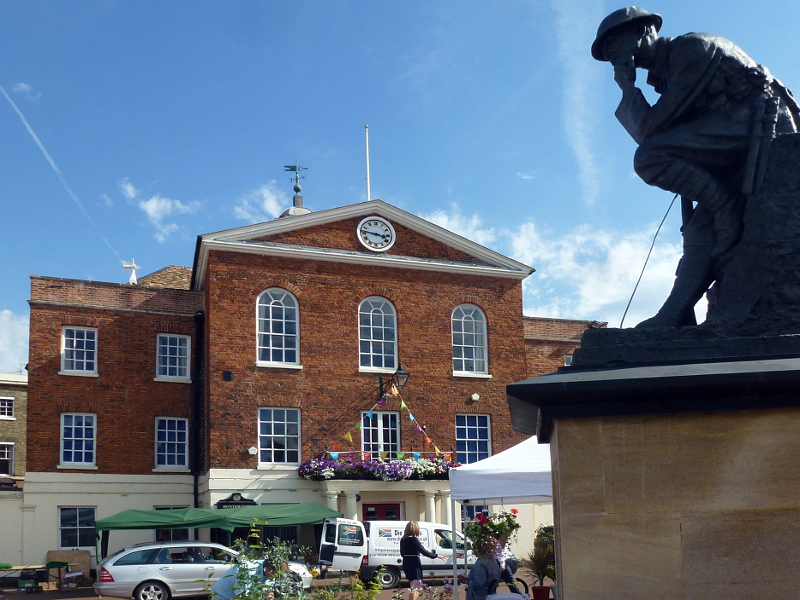 |
| Swarming robots |
So then, how are leading and following supposed to work in the church? Peter Farmer posted recently and pointed out that new forms of organisation might be like the flocking of birds or the shoaling of fish. If he is right (and I believe he is) then the normal ideas of leader and follower don't make much sense. Tell me, where in a flock of birds or a shoal of fish will you find the leader? One possible answer might be 'the one at the front', but this doesn't work. You don't have to watch a flock or a shoal for very long to see constant changing of position. There is not one identifiable leader. There is a great deal of coming and going, twisting and turning, and the flock or shoal as a whole seems to move purposefully - but how?
Studies of flocks, shoals and herds, swarms of bees and gnats, and foraging ants all show the same thing. Each individual is making its own choices of speed and direction independently of the flock. The individuals respond to certain cues, tending to keep the same distance from their neighbours and heading in more or less the same direction. There may be other cues; bees communicate direction and distance by special movements, ants leave trails of pheromones.
Simple robots (virtual or physical) can be programmed to do much the same. Give them just a few very simple rules and they will form swarms and move together.
In church life, we too follow some very simple rules. Here are some examples, perhaps you can think of more. (Leave a comment below if you can.)
- We focus on Jesus and do our best to follow him
- We pay attention to the promptings of the Holy Spirit
- We meet one another often
- We encourage one another
- We love one another
- We pay attention to the gifts we see in one another
- We ask one another for help when we need it
- We pray
- We share food together
- We show the world that Jesus is the Way, the Truth and the Life.
Taking these together and integrating them, I suggest we can see Jesus at the centre, discipleship, outreach, APEST leadership, an organic and living church, and an exciting journey together. If this sounds familiar - it should! For more, check out Jesus, Disciple, Mission, Church (JDMC). Notice the light touch of the APEST form of leading one another. We are all gifted and there are times for each one to contribute something that the others need to hear, see, understand or do.
I have a strong sense that as we keep these simple rules we will find we are living and moving in unison. Like the birds, fish and other animals mentioned above, we make constant adjustments to our course, but nobody commands us (other than the Spirit of Christ).
Not only do we not need leaders in the normal sense of that word, they will rather quickly take us way off track. If you think that is not the case just look at church history. If you like, look also at the history of Israel in the Old Testament. Open your eyes, see what human leadership has done over and over again. Church is a shoal in many ways and the right course is a course of togetherness, guided by those very simple rules.
Peter Farmer uses some interesting words as he considers a murmuration (flock) of starlings. These are trust, humility, unity and diversity. Do you recognise these in the list of simple rules above? He adds that the murmuration is highly adaptive, flexible, intuitive, constantly changing, everyone plays an important part and it's characterised by flow. All of these are attributes we would like to see in church life. Do you see them in the traditional denominations? Do you see them fully anywhere? Is there a sense of direction here.
How can we rethink human leadership to set the church free to flow and turn as it is intended to do? Christ's body should surely be nimble, athletic, fit and healthy. She should be adaptive, flexible, intuitive, constantly changing, everyone playing a part, and flowing.
I believe we face an important choice. Will we continue to control ourselves to a standstill? Or will we let go of all that holds us back and go with the flow of the Holy Spirit, living moment by moment by the simplest of rules? In the end, they really distill down to love.
How can we rethink human leadership to set the church free to flow and turn as it is intended to do? Christ's body should surely be nimble, athletic, fit and healthy. She should be adaptive, flexible, intuitive, constantly changing, everyone playing a part, and flowing.
I believe we face an important choice. Will we continue to control ourselves to a standstill? Or will we let go of all that holds us back and go with the flow of the Holy Spirit, living moment by moment by the simplest of rules? In the end, they really distill down to love.



















